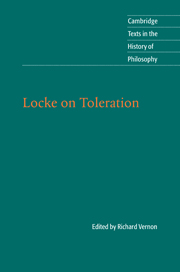Book contents
- Frontmatter
- Contents
- Acknowledgements
- Introduction
- Chronology
- Further reading
- Note on the texts and translation
- Locke on Toleration
- Locke: A Letter concerning Toleration
- Locke: From the Second Treatise (in Two Treatises of Government, 2nd edn, 1698)
- Locke: From An Essay concerning Human Understanding (4th edn, 1700)
- Proast: The Argument of the Letter concerning Toleration, Briefly Considered and Answered (1690)
- Locke: From A Second Letter concerning Toleration (1690)
- Proast: From A Third Letter concerning Toleration in Defence of the Argument of the Letter concerning Toleration, Briefly Considered and Answered (1691)
- Locke: From A Third Letter for Toleration (1692)
- Proast: From A Second Letter to the Author of the Three Letters for Toleration (1704)
- Locke: From A Fourth Letter for Toleration (1704)
- Index
- Titles in the series
Locke: From A Third Letter for Toleration (1692)
Published online by Cambridge University Press: 05 June 2012
- Frontmatter
- Contents
- Acknowledgements
- Introduction
- Chronology
- Further reading
- Note on the texts and translation
- Locke on Toleration
- Locke: A Letter concerning Toleration
- Locke: From the Second Treatise (in Two Treatises of Government, 2nd edn, 1698)
- Locke: From An Essay concerning Human Understanding (4th edn, 1700)
- Proast: The Argument of the Letter concerning Toleration, Briefly Considered and Answered (1690)
- Locke: From A Second Letter concerning Toleration (1690)
- Proast: From A Third Letter concerning Toleration in Defence of the Argument of the Letter concerning Toleration, Briefly Considered and Answered (1691)
- Locke: From A Third Letter for Toleration (1692)
- Proast: From A Second Letter to the Author of the Three Letters for Toleration (1704)
- Locke: From A Fourth Letter for Toleration (1704)
- Index
- Titles in the series
Summary
Chapter i [untitled]
I suppose you will grant me that anything laid upon the magistrate as a duty is some way or other practicable. Now the magistrate being obliged to use force in matters of religion, but yet so as to bring men only to the true religion, he will not be in any capacity to perform this part of his duty unless the religion he is thus to promote be what he can certainly know, or else what it is sufficient for him to believe, to be the true. Either his knowledge or his opinion must point out that religion to him, which he is by force to promote; or else he may promiscuously and indifferently promote any religion, and punish men at a venture, to bring them from that they are in to any other. This last I think nobody has been so wild as to say.
If therefore it must be either his knowledge or his persuasion that must guide the magistrate herein, and keep him within the bounds of his duty; if the magistrates of the world cannot know, certainly know, the true religion to be the true religion, but it be of a nature to exercise their faith (for where vision, knowledge, and certainty is, there faith is done away); then that which gives them the last determination herein must be their own belief, their own persuasion.
- Type
- Chapter
- Information
- Locke on Toleration , pp. 123 - 163Publisher: Cambridge University PressPrint publication year: 2010

